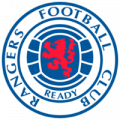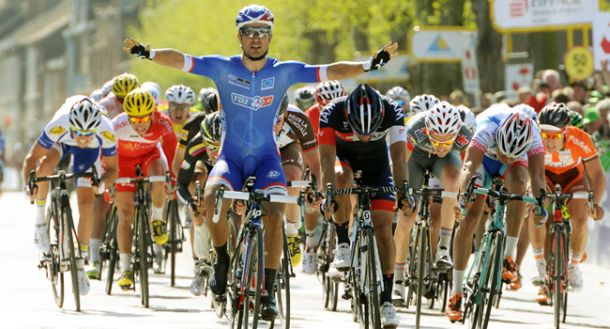Nacer Bouhanni (FDJ) is one of the leaders of a terrific new wave of French talent. The French FDJ team have built their squad for the Giro d’Italia around the 23 year old sprinter, and with the support of a solid sprint train, and experienced lead out men in Sebastien Chavanel and Geoffrey Soupe, Bouhanni has a great opportunity to claim his maiden Grand Tour stage victory.
Nacer Bouhanni is blessed with tremendous natural spee; while he is not yet at the level of the three elite sprinters, there are very few others who can claim to match him. An avid boxer, he was heavily involved in the sport when he was young, and still uses boxing as a form of training during the offseason. So it’s no surprise that Bouhanni is amongst the feistiest of sprinters, and more than capable of using his elbow, shoulder or head to look after himself in the chaos of a bunch sprint. Any rider trying to remove and supplant a sprinter from the base of their sprint train, would be well advised to select a different rider to target rather than taking on Bouhanni.
Bouhanni really started to come of age in 2012, his second full season as a professional with FDJ. Sprint victories in Etoile de Besseges, Circuit de Lorraine and Halle-Ingooigem were surpassed when Nacer Bouhanni became the French National road race champion. Bouhanni would win twice more in the second half of 2012, as well as making his Grand Tour debut at the Vuelta a Espana where he was 2nd behind John Degenkolb on stage ten, though he didn’t finish the race.
The following season brought many more successes, two wins in the Tour of Beijing, victory in the GP de Fourmies and a trio of wins in the Tour du Poitou Charentes amongst others. Best of all was a stage win and the assumption of the race lead in Paris-Nice, though a crash the following day put an end to that. Bouhanni also made two further truncated appearances in Grand Tours, with his debut in both the Giro d’Italia and the Tour de France. In the Giro Bouhanni recorded 2nd, 3rd and 4th place finishes on stages won by Mark Cavendish, before withdrawing from the race to focus on his Tour debut. However that race was one to forget for Bouhanni who sustained nasty injuries from crashes, he tried to ride through the pain but it proved too much.
Bouhanni has five wins so far in 2014 and seems to have a developed little more kick to his sprint; he won the opening stage in Paris-Nice to take the race lead, which was particularly impressive after a rough looking crash seemed to have taken him out of contention. However Bouhanni has also endured some frustrations this season, particularly being overlooked for Milan-San Remo in favour of fellow young star FDJ sprinter, Arnaud Demare.
Much has been made of the ability, or inability of Bouhanni and Demare to co-exist on the same team. Reports that they don’t get along appear to have been exaggerated. While they don’t have the relatively harmonious relationship that Marcel Kittel and John Degenkolb seem to share at Giant-Shimano, they also don’t have the acrimonious one that Mark Cavendish and Andre Greipel endured while at HTC. Instead what friction there is comes from the fact that they share some similar traits and target similar races. The team have struggled to accommodate them in the same line up, and having them in concurrent races has also been slightly problematic as there aren’t enough sprint support riders on the team to go around.
However as both riders develop that friction should recede, Bouhanni is the better pure sprinter, possessing a more explosive burst to the line than Demare. While Demare is the tougher rider, he copes well with the more difficult races and is developing into an impressive classics specialist. There will always be some overlap, but there is more than enough disparity between their skill sets that each could succeed at FDJ. However the sticking point may be the Tour de France, both are going to want to ride their home Grand Tour every season, and accomodating both could prove problematic Will either accept being subservient to the other? It is a particularly pertinent question as this was a contract season for both riders, the team moved quickly to ensure Demare would stay, but contract talks have been slower to develop with Bouhanni.
If Bouhanni should choose to leave FDJ, there will be no shortage of suitors; highly talented young sprinters aren’t easy to find. Regardless of whether Bouhanni opts to seek pastures new, or remain with FDJ, claiming his first Grand Tour stage win(s) at the Giro is certain to result in a more lucrative contract.









































